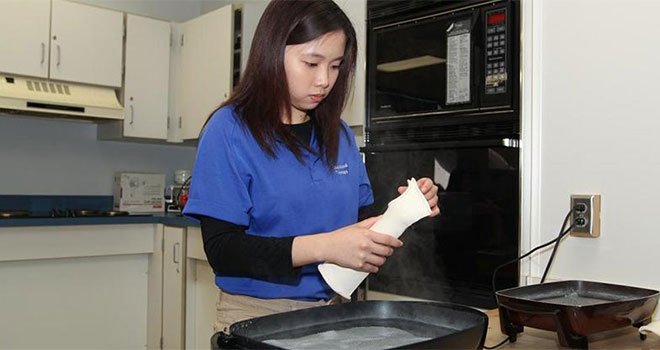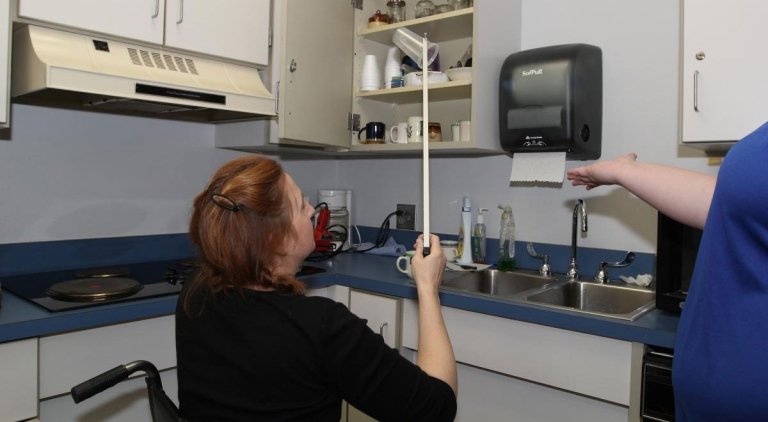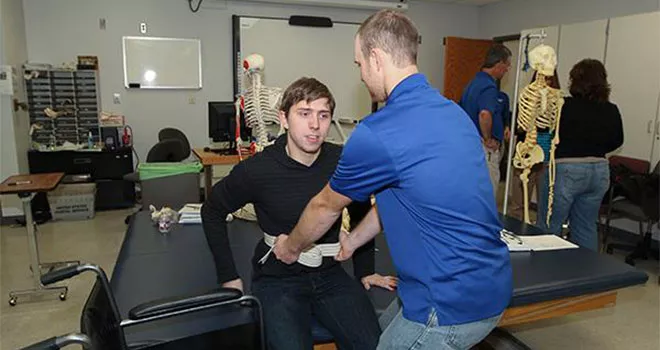Occupational Therapy Assistant, A.A.S.
Earn your A.A.S. in Occupational Therapy Assistant at TCC. Gain hands-on training, prepare for certification, and launch a rewarding healthcare career.
About the Occupational Therapy Assistant Degree
- Purpose: Prepare students to perform occupational therapy procedures and related tasks under the supervision of a Registered Occupational Therapist.
- Tasks: Perform various treatment procedures delegated by the Registered Occupational Therapist to patients with physical, psychological, or cognitive disabilities.
- Independence: Work independently in programs aimed at preventing disability and maintaining health, such as the role of an Activity Director.
- Certification: Graduates will be eligible to sit for the national certification examination for the occupational therapy assistant administered by the National Board for Certification in Occupational Therapy® (NBCOT).
- Designation: After successfully passing the exam, graduates will attain the title of Certified Occupational Therapy Assistant (COTA).
- Licensure: All states require licensure to practice, typically based on the results of the NBCOT certification examination. Note that a felony conviction may impact the ability to sit for the NBCOT certification exam or obtain state licensing.
Occupational Therapy Assistant Degree Details
Embark on a fulfilling journey with our Occupational Therapy Assistant, A.A.S. program. Develop essential skills, meet learning outcomes, and chart your path to success.
New Class Annually. Our Occupational Therapy Assistant Program admits a new class of up to 24 students during the fall term each year. The courses for this full-time program are offered in the daytime only and the program will take a total of six semesters to complete.
Upon successful completion of this program, you will be able to:
- Synthesize basic fundamentals of Occupational Therapy practice such as safety and ethics.
- Synthesize basic tenets of occupational therapy such as Occupational Therapy philosophy, Occupational Therapy / Occupational Therapy Assistant roles and evidence-based practice.
- Design client evaluation and screening within your scope of practice.
- Design client intervention within your scope of practice.
- Communicate to advocate client needs and status through verbal and non-verbal communication.
- Exemplify professional behaviors.
View the Degree Requirements to find out which courses and credits you'll need to earn your degree.
Explore the Program Map to see how you can complete your degree.

The applicant pool for programs in the School of Health Sciences is very competitive. An application does not mean acceptance into the Health Sciences program. Applicants must meet with a School of Health Sciences advisor before they apply to a program and may be required to attend an orientation for the Allied Health-related programs. All application correspondence from the School of Health Sciences will be through your TCC email. The Occupational Therapy Assistant Program accepts applications every year from Aug. 1 to Jan. 1.
- Apply to TCC
- Submit all official high school and college transcripts
- Submit ACT Scores
- Contact your Academic Advisor
- Complete the OTA Career Exploration Tool
- Review the Essential Functions and Estimated Cost of Program
- Apply to the OTA Program
Note: For information on applicant ranking see the OTA Applicant Ranking Scale.
Occupational Therapy Assistants (OTA) must possess the knowledge and skills to work with diverse populations in a variety of settings including: hospitals, long term care facilities, schools, supported employment environments, homes, community programs, assisted living and adult daycare settings.
The following are the abilities students must possess to successfully complete coursework in the OTA Program:
- The ability to observe and successfully participate in academic and fieldwork settings.
- The ability to read and comprehend written material at a college level including, but not limited to: texts; journals; articles; and electronic healthcare records.
- The ability to communicate effectively in oral and written form with students, faculty, staff, clients, family, and other professionals in both the academic and healthcare settings using appropriate grammar and spelling.
- Effective interpersonal skills necessary for productive classroom discussion and respectful interaction with classmates, faculty, fieldwork educators and clients. These skills include, but are not limited to: expressing ideas and feelings clearly, being able to exchange information effectively and communicating with others in a respectful confident manner.
- Cognitive skills for problem solving, clinical reasoning and judgment and ability to respond and make decisions in a safe and effective manner.
- Emotional health and stability required for exercising good judgment, full use of intellectual abilities and prompt completion of all academic and fieldwork responsibilities as well as the ability to be flexible and to adapt to changing environments.
- Be aware that the work required of an OTA is very physically demanding. For example, OTA’s are very often required to transfer and transport patients that are too weak to physically assist. Therefore OTA’s must possess the motor and sensory ability to safely complete required tasks in a timely manner and perform simple and repetitive tasks as needed, independently, as well as the ability to direct others, and / or use assistive technology perform complex and varied tasks as needed, independently.
Reasonable Accommodations
TCC is committed to creating and promoting an accessible learning environment for all students. "Reasonable accommodation" refers to ways in which the College addresses any barriers to full participation in the academic and co-curricular experience.
Examples of reasonable accommodations include but are not limited to: instructional materials in alternative formats; alternative testing arrangements; and use of assistive technology such as text-to-speech software. While reasonable accommodation does not mean that students will be exempt from required tasks, it does mean that the Occupational Therapy Assistant Program desires student success and is committed to working with all students giving every opportunity for success.
Students accepted into the OTA program who wish to request reasonable accommodations are encouraged to contact the Accessibility Resources prior to the start of the program. The College has policies regarding documentation of disability and a process for requesting accommodations. Reasonable accommodations in classroom and in fieldwork settings cannot be provided without the formal request and the required documentation. To learn more contact the Accessibility Resources at 918-595-7115.
By completing the OTA application, you verify that you can perform all of these function, with or without reasonable accommodations.
| Course Breakdown | Tuition | Fees | Books and Supplies | Total |
|---|---|---|---|---|
| Program Prerequisites | $1,022 | $200 | $78 | $1,300 |
| First Year of Program | $4,380 | $292 | $2,038 | $6,710 |
| Second Year of Program1 | $3,796 | $855 | $709 | $5,360 |
| Program Totals | $9,198 | $1,347 | $2,825 | $13,370 |
Note: Costs updated Feb. 1, 2024, using In-State/Resident rates. The prices listed are only an estimation. Actual totals may vary.
1 Includes Board Exam & Licensure Costs
Student graduation rates indicated are per academic year. Graduation occurs in May of each academic year.
| Graduation Year | Students Entering | Students Graduating | Graduation rate |
|---|---|---|---|
| 2022 | 19 | 18 | 95% |
| 2023 | 17 | 16 | 94% |
| 2024 | 15 | 15 | 100% |
| 3-year Total | 51 | 49 | 96% |
TCC OTA certification exam outcomes can be verified with National Board for Certification in Occupational Therapy’s (NBCOT).
The Occupational Therapy Assistant program is accredited by the Accreditation Council for Occupational Therapy Education (ACOTE) of the American Occupational Therapy Association (AOTA), located at 7501 Wisconsin Avenue, Suite 510E, Bethesda, MD 20814. ACOTE’s telephone number, c/o AOTA, is 301-652-6611.
AOTA
301-652-6611
accred@aota.org
https://www.aota.org/

ACOTE® accredited occupational therapy and occupational therapy assistant educational programs satisfy the states’ educational requirements in all states, the District of Columbia, and Puerto Rico.
Students graduating from an ACOTE® accredited occupational therapy and occupational therapy assistant educational program are eligible to take the National Board for Certification in Occupational Therapy (NBCOT) certification exam and apply for licensure in all states, the District of Columbia, and Puerto Rico.
Get more information regarding state qualifications and licensure requirements.
View the Professional Licensure Disclosure for this program.
Concerns or complaints that fall either within due process or outside of due process regarding the OTA Program may be directed to:
Dina Anderson, MOT, OTR/L
OTA Program Director and Assistant Professor
918-595-8596
dina.anderson@tulsacc.edu
School of Health Sciences
TCC Metro Campus
909 S. Boston Ave
Tulsa, OK 74119
Complaints will be handled in a consistent and equitable manner without retaliation of any kind regardless of the identity of the complainant. Incidents, complaints or concerning behavior happening at TCC may also be reported via TCC Report It!
Program Contact
Program Director
Dina Anderson
918-595-8596
dina.anderson@tulsacc.edu
School of Health Sciences
TCC Metro Campus
909 S. Boston Ave.
Tulsa, OK 74119
918-595-7002
healthsciences@tulsacc.edu

Why Occupational Therapy?
Learn more about this rewarding career and why it might be the degree for you.

Careers in Occupational Therapy
Don't miss out on the opportunity to connect with our Career Services professionals. Schedule a session now to explore the comprehensive range of complimentary resources available for career planning and job preparation.
